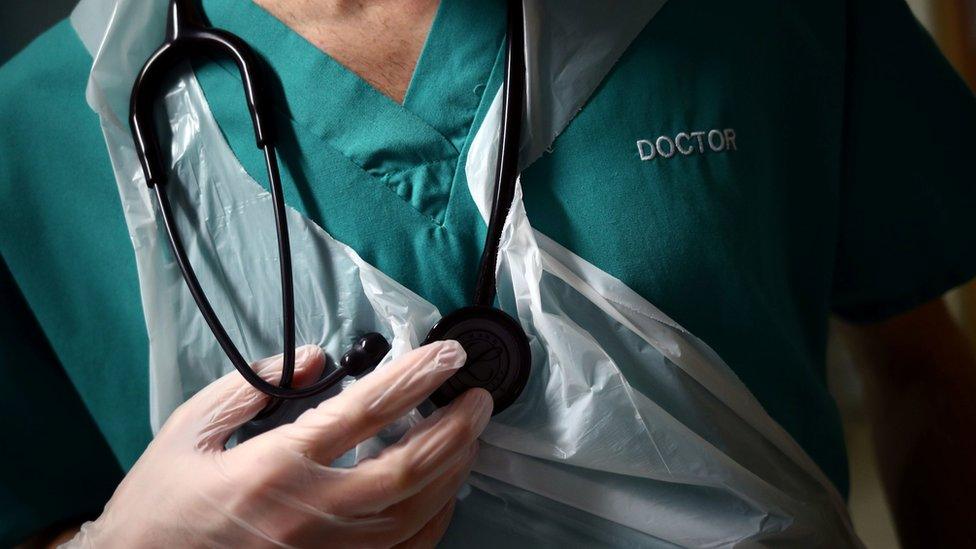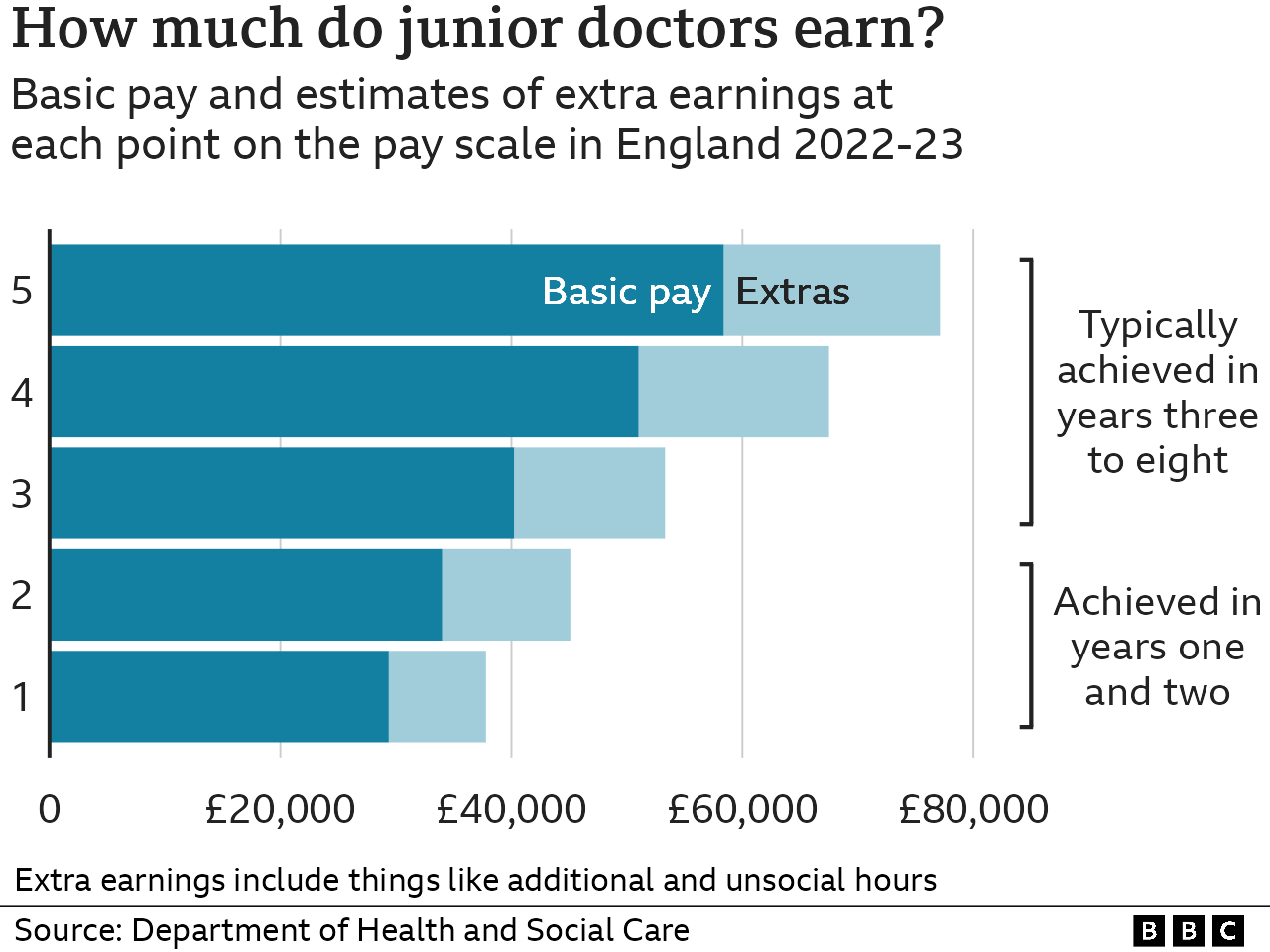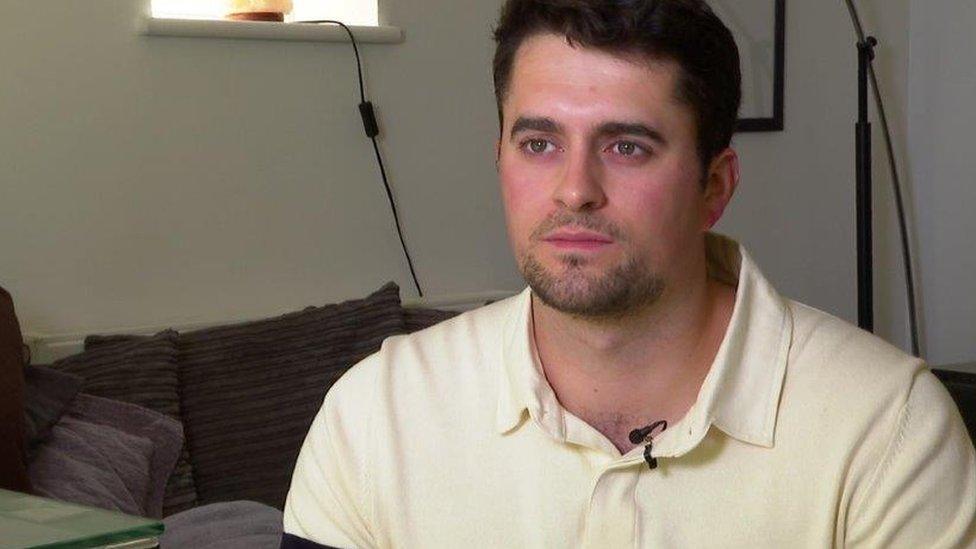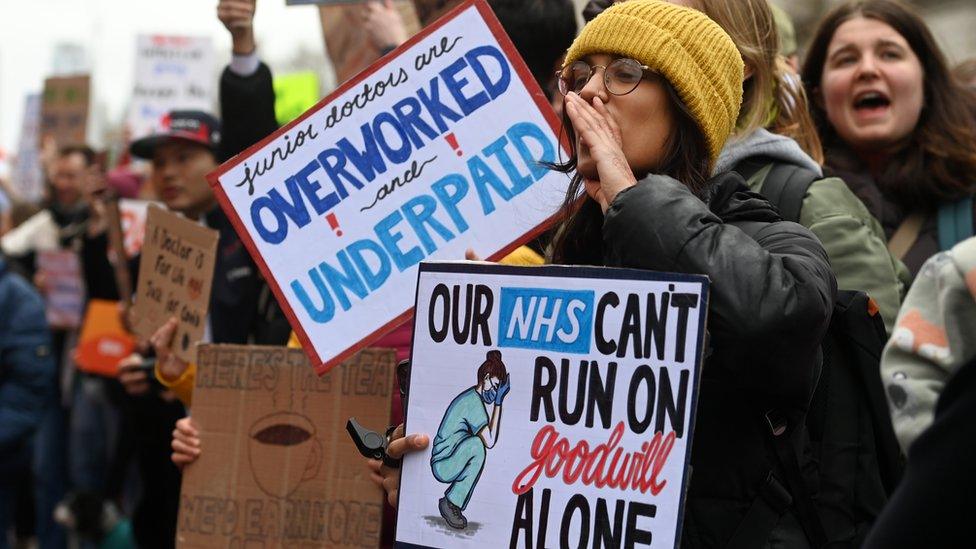Hot weather adds to NHS pressure as doctors strike
- Published

Health bosses are warning of major disruption and pressure on the NHS in England, as the hot weather combines with the latest junior doctor strike.
British Medical Association members will walk out for 72 hours from 07:00 on Wednesday.
It is the third strike in the pay dispute and is expected to lead to the cancellation of much routine care.
And with the heat placing extra demands on A&E units, bosses urged people to use services sensibly.
Junior doctors, nearly half the medical workforce, will walk out of both routine and emergency care.
NHS England said the health service would have to prioritise emergency and life-saving care. The hot weather was already causing high demand for urgent services - and people should avoid the sun at the hottest time of day and drink plenty of fluids.
Alongside heat-stroke, hot weather also brings an increase in heart failure and kidney problems as well as high rates of sprains and fractures and respiratory problems.

Consultants are being drafted in to provide cover during the strike but the amount could be lower than during previous junior doctors' strikes, in March and April.
Rory Deighton, of the NHS Confederation, which represents health bosses, said a particular challenge this time was "securing the level of consultant cover" - because of the amount consultants were asking for overtime payments - creating uncertainty over how many appointments would need to be postponed.
The four-day April walkout saw about 196,000 hospital appointments and treatments postponed. And the hospital waiting list, growing since the start of the pandemic, has now hit a record 7.4 million people.

"Each wave of strikes chips away at the NHS's resilience, impacting on staff, internal relationships and their ability to deliver on government pledges to reduce the elective backlog," Mr Deighton said.
'Significant disruption'
NHS England medical director Prof Stephen Powis said the strike would have an "enormous impact".
"The NHS is facing significant disruption this week, with a three-day strike that is set to be exacerbated by the ongoing hot weather," he said.
"Emergency, urgent and critical care will be prioritised this week but some patients will unfortunately have had their appointments postponed - if you haven't been contacted to reschedule, please do continue to attend your planned appointment.
"As ever, use 999 and A&E for life-threatening emergencies - and NHS 111 online for all other health conditions."
While hospitals are expected to bear the brunt of the disruption, community services, including GPs, will be much less affected.

'Staff shortages putting care at risk'

Dr Tom Corkery-Bennett is in his second year as a junior doctors and works in the A&E at Royal Berkshire Hospital.
He works an average of 48 hours a week, but can put in up to 60 and regularly receives messages asking if he can take on extra shifts.
What has happened to pay was a major factor in the staffing shortages, the 26-year-old said, and "grossly unfair".
"The resilience in the system is so low - staffing levels are skeletal," Dr Corkery-Bennett said.
"There is very often situations where doctors call in sick for a nightshift and there's no cover available.
"It means there's a large number of patients without a doctor to cover them and care is really put in jeopardy.
"One doctor will cover the work of two or three doctors if there's no contingency plan in place, which very often happens, and that's unsafe."


Junior doctors want a 35% pay hike to make up for 15 years of below-inflation rises.
In talks last month, the government offered an extra 5%, which Health Secretary Steve Barclay called "fair and reasonable", adding the "extremely disappointing" walkout would put patients at risk.
Shadow health secretary Wes Streeting said he wished the strikes were not going ahead, but added the reason for them was "because they haven't got someone to negotiate".
He told BBC Radio 4's Today Programme that the strikes should be viewed alongside the broader range of issues affecting doctors, such as retention and career progression, but would not be drawn on what salary Labour would offer doctors if in government.
"I really do fear what the state of the economy will be by the time of the next general election - I can't yet be sure what the state of the public finances will be and at the moment I'm fearing the worst."
Prof Powis told the same programme that other discussions held between government and other NHS employees showed it was possible to resolve disputes, but the "key is talking".
BMA junior doctor leader Dr Vivek Trivedi said the offer from government "beggars belief" given inflation had reached double-digits this year.
'Properly valued'
"Junior doctors are in despair at this government's refusal to listen," Dr Trivedi said.
"We have made clear that junior doctors are looking for the full restoration of our pay.
"The NHS can only function with a workforce that is properly valued."
BMA Deputy Chair Emma Runswick told the BBC that doctors' roles had become more important since 2008 and that they were "not willing to accept that further pay cuts is all the government can give us".
This walkout affects services in England only - but junior doctors in Scotland have this week announced they too will be going on strike, after a vote by BMA members.
A strike ballot for consultants in England is also being held. And Royal College of Nursing members are voting on whether to continue their industrial action, after joining the minority of health unions to have rejected the government's offer of 5% plus a one-off payment of at least £1,655.

Have you had your treatment cancelled? You can share with us by emailing haveyoursay@bbc.co.uk, external.
Please include a contact number if you are willing to speak to a BBC journalist. You can also get in touch in the following ways:
WhatsApp: +44 7756 165803, external
Tweet: @BBC_HaveYourSay, external
Or fill out the form below
Please read our terms & conditions and privacy policy
If you are reading this page and can't see the form you will need to visit the mobile version of the BBC website to submit your question or comment or you can email us at HaveYourSay@bbc.co.uk, external. Please include your name, age and location with any submission.

- Published18 May 2023